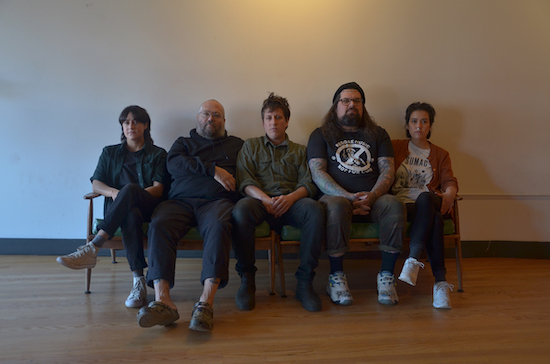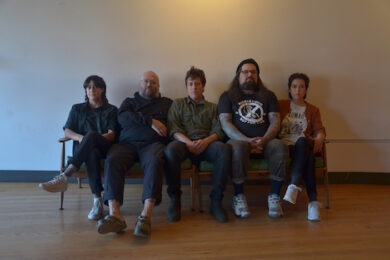Despite expectations that could be drawn from previous works, the actual manifestation of their collab is a twist in the story for both groups. In place of metal’s various shapes of aggression, Leaving None But Small Birds turns to the emotional density of folk and traditional tunes to tell enduring stories of suffering, tragic loves, and forgotten lives. After the shock brought forward by the bluesy guitar licks, swirling violin cries, bittersweet piano stabs, and Wattie’s soulful crooning during the first minute of opener ‘Blackest Crow’ subsides, the quintet’s aesthetic choices click in place. It quickly turns out that fusing Appalachian, Canadian, and British folk with country, blues, and a touch of metallic weight was indeed a stroke of brilliance. Illuminated by this approach, the struggles and pains that make the essence of the album seep through unfiltered, hitting harder and deeper than perhaps on any other release in the bands’ combined discographies.
Like on Big Brave records, Robin Wattie’s lyrics and voice are a guide on the journey through the darkness. As if expanding a memory quilt passed on through generations, she sews in her own experiences and existing folk narratives, then recounts them through the perspectives of the marginalised and wronged. In doing so, she pulls the thread that unravels any misunderstandings of folk as a static form. When she reshuffles fragments of traditional melodies and verses, the songs begin to teeter between the familiar and the strange. Leaving None But Small Birds thus taps into something primordial and reaffirms music as a living and breathing, beautifully unstable collection of memories to be shared and passed on orally.
Simultaneously, The Body’s drummer Lee Buford and multi-instrumentalist Chip King and Big Brave’s drummer Tasy Hudson and guitarist Mathieu Ball lean heavily into the inherently droning, textural nature of folk music, creating sparse ever-changing backdrops for Wattie’s impassioned delivery. With a varied but understated instrumentarium, which includes both expansive textures and the pointilistic sounds of a dulcimer, shruti box, and piano, they create voluminous spaces between jangling guitar riffs and resounding tom hits. Their phrases are locked in patterns that circle, spiral, and meander almost imperceptibly at first, before building into monumental flashes of noise. Away from the usual start-stop structure of Big Brave’s material, Wattie’s singing is fluid and overflowing with emotion. Yet she always remains full of conviction and in control, even as her lines trail off in signature howls. And when Hudson joins her in vocal harmonies, their entangled polyphonies sound akin to a Greek chorus resurrected to narrate contemporary injustices.
Perhaps the most poignant demonstration of this musical storytelling comes on ‘Polly Gosford’, a misogynistic murder ballad reframed into a feminist tale of vengeance. Here, Wattie soars with intent over pulverising bouts of percussion and electric distortion and delivers some of the most stirring, nigh overwhelming moments of the album. “But the ghost of this maiden / Would not let him be,” she roars, embraced by a soul shattering crescendo. “She broke him, she tore him / She ripped him in three / Because he murdered / Her baby and she.”
Elsewhere, the dusty desert rock dread of ‘Oh Sinner’ revolves around a heavily distorted, reverberating riff, before settling into an insidious rhythm, alluding to what a better version of David Eugene Edwards’ Wovenhand might sound like. Resonating organ lines, exquisitely deranged folk noise clatter and sharp piano chords devour Wattie’s lamentations about child labour and worker exploitation then and today on ‘Hard Times’. In contrast, ‘Once I Had A Sweetheart’ and ‘Black Is The Colour’ are brighter, bittersweet cuts truer to their influences, with wistful melodies tinged in sepia by resounding guitar phrases akin to a plunking banjo.
The closing few minutes of ‘Babes In The Woods’ bid farewell to the album with a mood of macabre earthy mysticism. Accompanied by a stomping rhythm, Wattie and Hudson are left alone in the woods to invoke spirits of the dead around a campfire. As these final notes trail off, Leaving None But Small Birds instills a trembling sigh, which resonates long after the last notes die.



